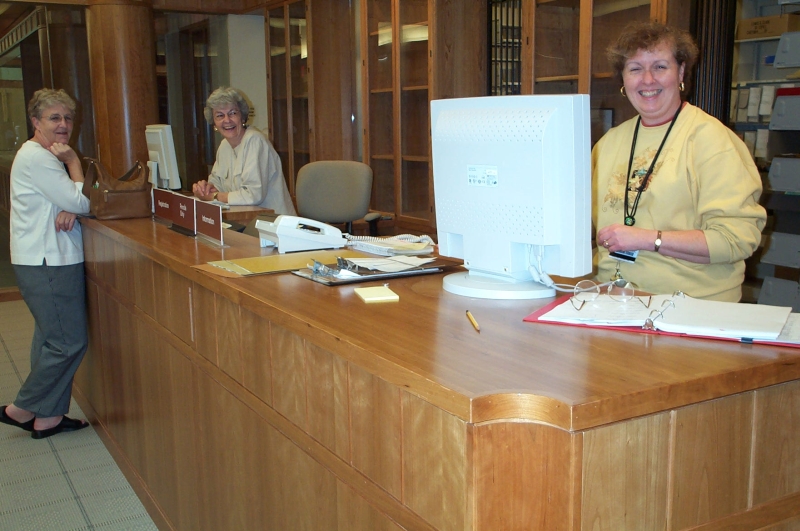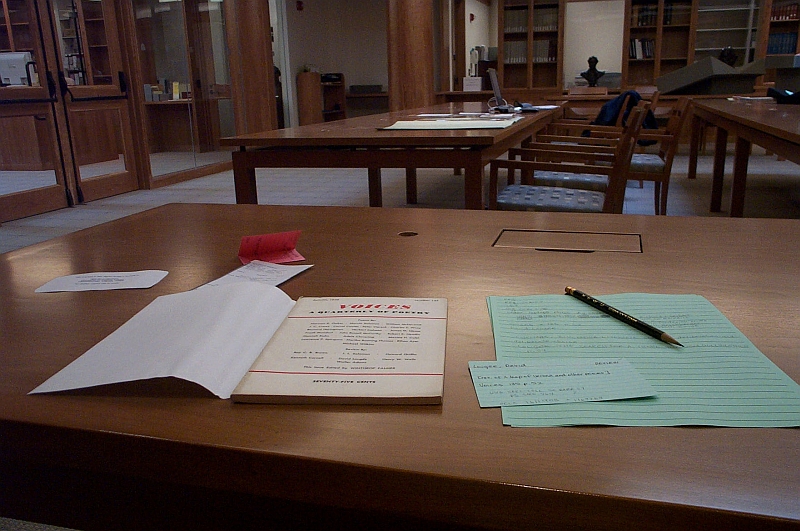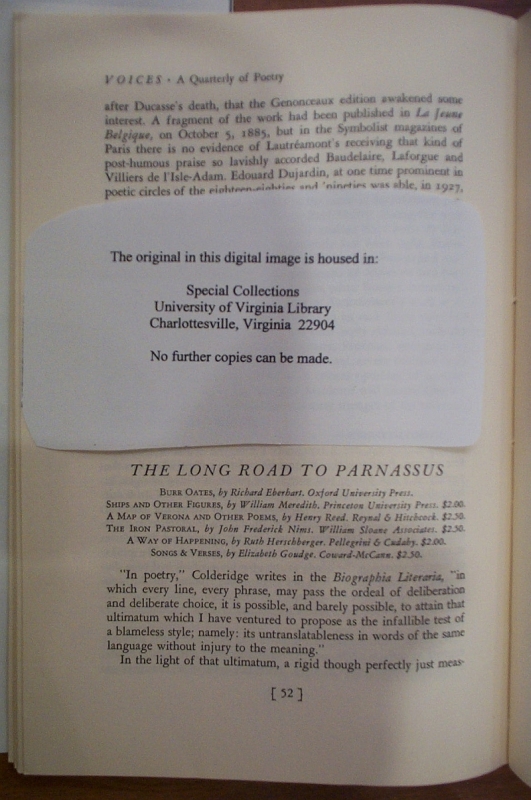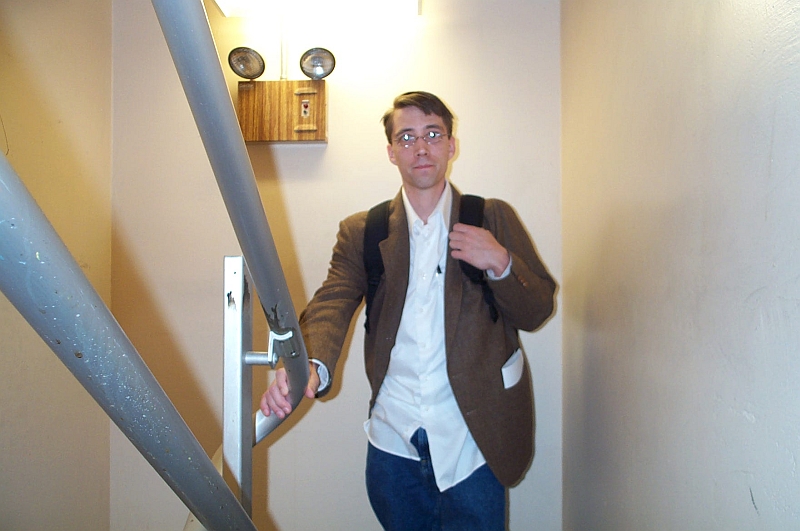I planned like for an expedition to a jungle temple in Central America: I called ahead to check the hours for special collections, and ensure availablity. I had the nice folks at offsite stacks deliver a particular volume to the main branch (which meant setting up a user account for me, right over the phone. Sweet). I pulled all my notecards for 1940s and 50s journals, and jotted down the call numbers for odd memoirs and anthologies. I printed driving directions, maps, floorplans and cross-sections of the library. Took money out of savings, gassed up the wagon, and topped off the windshield-wiper fluid and coolant. Sharpened pencils. I even filled a Ziploc baggie with dimes to feed the photocopiers.
But by far the smartest thing I did was pack along my digital camera (click for bigger):
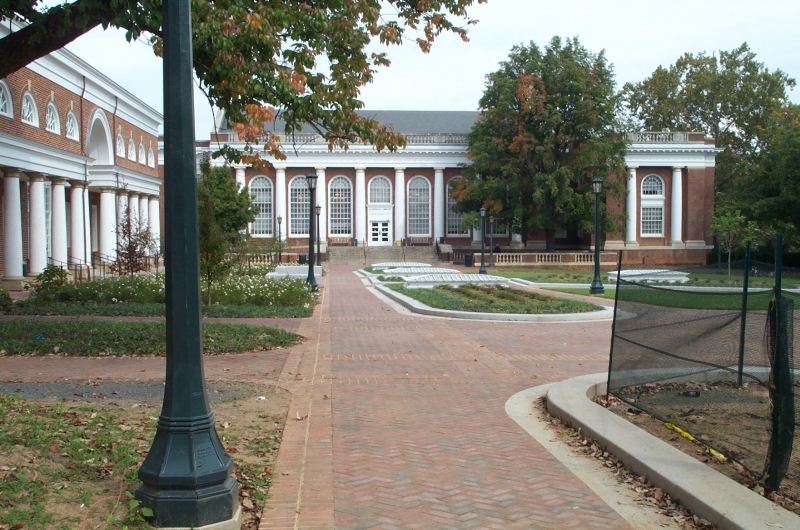
Alderman library, University of Virginia, center. The new
Albert and Shirley Small Special Collections building is on the left.
Campus was nearly abandoned: just a few straggling students playing catch up, hoping to get ahead for the second half of the semester; moms and dads down for the weekend, getting the 25¢ son-or-daughter tour. (Is that Monticello? No, Ma. That's not Monticello. Oh. Is that Monticello?)
Special Collections was the highlight of my day. They just moved into new facilities, and the building sparkles. Carpenters were still outside, putting finishing touches on cornices and window details. There's a grand, winding marble staircase inside that descends two floors, to the oak-trimmed reading room. The staff were still learning the new procedures, but the ladies were courteous and extremely helpful, walking me through each step to get the material I needed: register, request the volume online through the catalog, backpack goes in a bus station coin-op locker, sign in, pencils only in the reading room, please.
A few minutes wait, and a 1948 issue of voices was delivered to my table, directly.
It was unclear whether or not I'd be allowed to request photocopies of the article I was interested in, but I noticed another gentleman in the reading room taking digital pictures of some old, fragile maps, inked by Thomas Jefferson's personal assistant, probably. (Except for his bookishness, this gentleman looked like a spy in some James Bond flick, leaning over documents, clicking away, his camera charge annoyingly beeping its readiness to take the next image.) I asked if it would be all right if I did the same thing, and bam! Permission granted. I had only packed the camera to document the expedition, and ended up with a memory card full of (slightly blurry) pictures of a fifty-year-old book review.
And because I am an inveterate, consummate researcher (read: anal-retentive perfectionist), I also spent twenty minutes copying out the relevant paragraphs, longhand. (On the green, ruled paper provided for me, specially!) You know you're a geek when you start describing italics and other Font-Variants in longhand.
The rest of my day was spent in Alderman (hey, look: David Sedaris is reading in Charlottesville later this month!), blissfully bathed in the whitehot light of the photocopiers, deciphering the cryptic locations of coded call numbers, tracking the Borgesian trail of letters and decimals around corners and down long walls of stacks, navigating the narrow, sarcophagus-like stairwells between floors. Alderman is built into the side of a hill: the front entrance is actually on the fourth floor, and the majority of the collection is underground on three sides. They even have middle floors-between-floors, like in "Being John Malkovich." going downstairs you pass 3M... 3... 2M... 2... 1M... until finally hitting rockbottom level #1. I have to mention, despite the claustrophobically-low ceilings, that the stacks were sufficently lit and the books were remarkably well-ordered (which means either the staff are particularly hard-working, or the sections I was in don't get used much).
By about three o'clock I knew I wasn't going to get everything done in one day. I reshuffled my pile of citations, prioritizing by need and by speed. secondary sources went straight to the bottom of the pile. Rising to the top were reviews and poems written by my author, in old, british journals located way down in the unsubbottombasement. The journals were unbound, printed during or following the second world war on rotten, yellowing woodpulp, brittle as peanut candy, tied together into bundles of years with string. There, I encountered my only disappointment of the day: a poem had been razored out by a disrespectful vandal, forming an impromptu Burroughs cut-up, words on two adjacent pages running together to make sensical nonsense. Them's the breaks, Indiana Jonesing the Library of Doom: sometimes, some dirty collaborating Belloq gets there first.
Despite the fact that now i must seek another library with that particular volume of that particular journal, it was sort of cool, reassuring even, to find that someone had beaten me to it. That someone else had liked it enough to clip it when they read it, that it meant so much to them they would take the elevator down six floors to the basement of the library, just to steal a poem.







